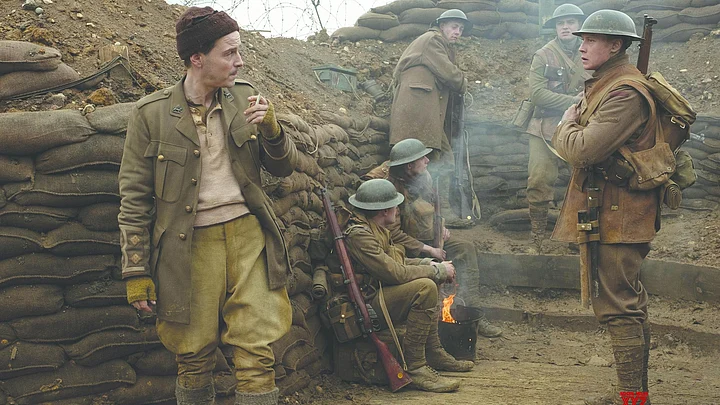When a song appears in the minefield of war on a fateful morning in Sam Mendes’ 1917, it’s a moment of great despair and of great hope. Our protagonist, after battling enemy bullets and bombs, jumps into high water that ultimately takes him to a quiet land. You can barely hear his footsteps as he walks to a little hillock, and a human voice greets him. The voice floats in like the humming of an angel, for our boy has come here crossing a hell that would send Dante nightmares. He walks in, and joins hundreds of soldiers like him, absorbed in the song. As the camera takes in the faces, you notice faces of boys and men, as blank slates of fate. It’s a lullaby for a sleep they’re most likely to not wake up from.
1917 (Mendes working with co-writer Krysty Wilson-Cairns) is already picking up laurels for its technical accomplishment of a seemingly single take film, and is a strong contender at the Oscars this year. But its real power lies in its quiet moments.
The film opens in a meadow where two young British soldiers, Blake (Dean Charles Chapman) and Schofield (George MacKay) are resting during their off time. With field telephones cut, they get marching orders to be messengers on foot to deliver a warning to another British regiment which is planning an attack on retreating German forces. The message is urgent because the enemy withdrawal is essentially a trap for the 1,600 British men that include Blake’s brother. The camera begins to stalk the boys walking, crawling, running as the green fields turn into a labyrinth of craters, barbed wires, and indistinguishably rotten bodies of men and animals. Another image of a green paradise will bookend the film, rendering the journey to hell and back a note of moving grace. A film poetry for the mobile generation.
Poetry is there, everywhere, and Mendes, the careful craftsman of curated spirits uses poetry literally to magical effects. If The Wayfaring Stranger becomes the cradlesong for grown men, he makes a General spew Kipling’s lines to offer nihilist hopes to the boys rushing to the mouth of killing. But the most poignant halo of the film arrives in the nightmare alley of a ravaged French town when young Schofield meets a terrified young woman in a ghostly house. While faint blasts can be heard, a baby appears out of the darkness, illuminated partially by overhead flares and a dying light in the room. For the young man, it’s a little solace. In the whispering tenderness of words, he recites Edward Lear’s The Jumblies to the baby. The war rages on, but the soldier has understood the futility of it all.
1917 is a tremendous addition to the canon of war films, a lean mean story that turns a war film into a tick tock thriller. The director takes a leaf out of the tales his grandfather, Alfred Mendes, a veteran of World War I, narrated to him during his childhood.
Many famous names pop up in the story as marginal characters, ranging from Mark Strong, Colin Firth, Benedict Cumberbatch to fresh sensations like Andrew Scott and Richard Madden. But the show belongs to two young men, aptly chosen by Mendes to cross no man’s land. Blake is a lively character who longs for his family, a heroic medal, and is beating with thumping love to save his elder brother. The quieter Schofield, on the contrary, is disenchanted with the very idea of war, fresh off the Battle of the Somme, shrugging off a medal he has recently won. Both these boys, their faces, effortlessly tell you about young kids who have no idea about the horrors that await them.
MacKay’s face, quite unlike anything gallant or traditionally handsome, works like an unelaborated canvas on which Mendes portrays the uncertainty and terrors of the war with sweeping alacrity. It’s the kind of face that reminds us of Aleksey Kravchenko’s young Flyora who hasn’t ceased to haunt us since he appeared in Elem Klimov’s masterpiece Come And See.
Of course, we have to talk about the great Roger Deakins and his all-encompassing camerawork that makes the film appear like a single unbroken shot, carefully stitched together by clever editing much like Alejandro G. Iñárritu’s Birdman.
But this soaking camerawork sometimes can be distracting, for sometimes your eyes wander and wonder where must have the camera blinked. This film with its exterior universe would have been almost impossible in the pre-digital era as one continuous shot, but Mendes with his trusted cinematographer Deakins and Thomas Newman’s soaring score do manage to make an epic, immersive show, which embraces the audience like a virtual-reality apparatus.
The great French director François Truffaut famously said, “There’s no such thing as an anti-war film”, for most war films in their recreation of big battles end up glorifying the muscular display of death and destruction. Mendes does well here, for he stays away from the spectacle. There are scenes of genuine dread that flare up all of a sudden, but its most fatal attack takes place off screen, when the camera is not looking. A bold bit of storytelling move, and an eye reaching out for cinematic verse. Like Klimov, Mendes would have made Truffaut proud.
(The writer is a journalist, a screenwriter, and a content developer who believes in the insanity of words, in print or otherwise. He tweets @RanjibMazumder)
